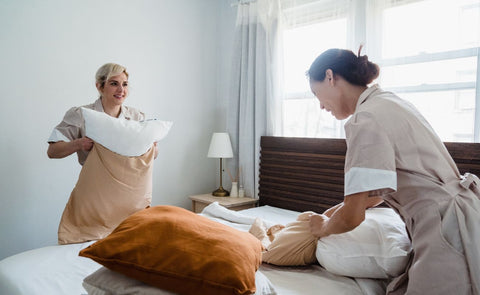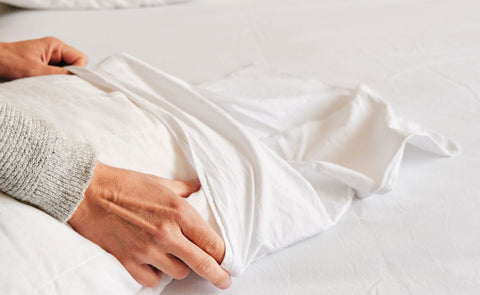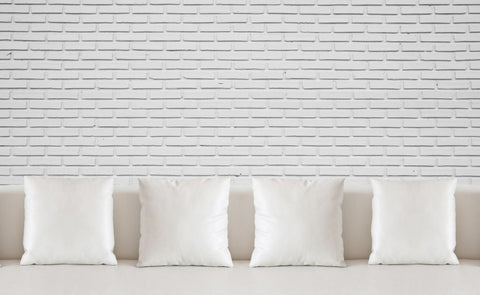Are you looking to upgrade your home decor with beautiful pillow covers but feeling overwhelmed by all the options? You're not alone. Understanding what is the rule for pillow covers can make all the difference between saggy, unprofessional-looking pillows and plump, designer-worthy accent pieces that transform your space.
Why Knowing the Rules for Pillow Covers Matters
When it comes to home decor, the details make all the difference. Pillow covers are one of the easiest and most affordable ways to refresh your space, add pops of color, and introduce new textures. But to achieve that professional, high-end look, you need to understand the fundamental rules that designers follow.
Did you know that something as simple as choosing the wrong insert size can completely ruin the appearance of your pillows? Or that certain materials work better for specific uses? Let's dive into the essential rules for pillow covers that will elevate your home decor game.
The #1 Rule: Proper Sizing for Pillow Covers and Inserts
The most important rule for pillow covers is getting the size relationship between your cover and insert right. This single factor can make or break the appearance of your decorative pillows.
The 2-Inch Rule for Square Pillows
For standard square pillow covers, the golden rule is to use an insert that's 2 inches larger than your cover. For example:
-
For an 18" x 18" pillow cover, use a 20" x 20" insert
-
For a 20" x 20" pillow cover, use a 22" x 22" insert
-
For a 22" x 22" pillow cover, use a 24" x 24" insert
This sizing difference ensures your pillows look plump, full, and professionally styled rather than saggy or underfilled.
Special Rules for Other Pillow Shapes
While the 2-inch rule works for most standard square pillows, there are exceptions:
-
Lumbar Pillows: For rectangular lumbar pillows, the recommended approach is to use an insert the same size as your cover to prevent overstuffing.
-
Small Pillows: For pillows smaller than 18" x 18", use an insert just 1" larger than the cover.
-
Extra-Large Pillows: For pillows 24" x 24" or larger, you might want to go up 3" in insert size for an optimally plump appearance.
Rules for Pillow Insert Materials
The material inside your pillow insert significantly impacts how your pillows look and feel. Here are the rules for choosing the right insert material:
Feather and Down Inserts
Feather and down inserts are considered the premium choice for decorative pillows. They offer several benefits:
-
They provide both firmness (from feathers) and softness (from down)
-
They hold their shape better than synthetic alternatives
-
They allow for the popular "karate chop" look that many designers love
-
They have more "give," making it easier to fill out corners
The standard ratio for decorative pillows is typically 90% feather/10% down or 95% feather/5% down. These ratios provide the perfect balance of support and softness.
Down Alternative Inserts
If you have allergies to feathers or prefer animal-free options, down alternative inserts are your best choice:
-
Look for high-quality options with a 50% woven cotton/50% polyester blend
-
Choose denser alternatives that can mimic the weight and feel of feather inserts
-
Be aware that most synthetic inserts won't hold the "karate chop" as well as feather inserts
Rules for Pillow Cover Materials and Durability
The fabric you choose for your pillow covers should align with how and where you'll use them:
For High-Traffic Areas:
-
Choose durable, washable fabrics like performance linen, cotton, or treated fabrics
-
Avoid delicate materials that can't withstand regular use
-
Consider darker colors or patterns that won't show dirt as easily
For Decorative Use:
-
Luxurious fabrics like velvet, silk, or embroidered materials work well
-
Consider seasonal fabrics—lighter linens for summer, heavier velvets for winter
-
Special finishes or details like tassels and fringe can add visual interest
Quantity and Arrangement Rules
Once you have the right pillow covers and inserts, how many should you use and how should you arrange them?
Sofa Pillow Rules:
-
For a standard three-seat sofa, use 4-5 pillows
-
For a loveseat, 2-3 pillows works well
-
Mix different sizes (not just all 20" x 20")
-
Create depth by placing larger pillows in the back corners and smaller ones in front
Bed Pillow Rules:
-
For a king bed, use 2-3 Euro pillows (26" x 26") against the headboard, followed by sleeping pillows and 2-4 decorative pillows
-
For a queen bed, use 2 Euro pillows, sleeping pillows, and 2-3 decorative pillows
-
For a twin bed, one Euro pillow, sleeping pillow, and 1-2 decorative pillows
Maintenance Rules for Pillow Covers
To keep your pillow covers looking their best:
-
Read care labels carefully—some covers are dry clean only
-
Wash removable covers every 3-6 months (more often for high-use areas)
-
Store seasonal pillow covers flat or rolled (not folded) to prevent creasing
-
Fluff and rotate feather/down inserts regularly to maintain their shape
Color and Pattern Rules for Pillow Covers
Creating a cohesive look with your pillow covers requires some basic design rules:
-
Choose a color palette with 2-3 main colors plus accent colors
-
Mix patterns in different scales (large, medium, small)
-
Include at least one solid color pillow to give the eye a place to rest
-
Consider the 60-30-10 rule: 60% dominant color, 30% secondary color, 10% accent color
When to Break the Rules
While these are the standard rules for pillow covers, interior design is also about personal expression. You might choose to break the rules if:
-
You prefer a less full, more relaxed look (in which case, you might use an insert the same size as your cover)
-
You want an exceptionally plump pillow (you might go up 3" instead of 2" for your insert)
-
Your unique space or furniture requires a different approach
Budget-Friendly Rules for Pillow Covers
You don't need to break the bank to achieve a designer look with your pillow covers:
-
Invest in high-quality inserts that will last for years
-
Purchase covers that can be easily changed seasonally
-
Look for sales or consider DIY covers from quality fabrics
-
Focus on one or two statement pillows paired with more affordable solid options
Final Thoughts: The Most Important Rule of All
While all these guidelines are helpful, the most important rule for pillow covers is to create a space that feels right to you. After all, your home should reflect your personal style and provide comfort for you and your family.
By understanding what is the rule for pillow covers—from proper sizing to material selection and arrangement—you'll be well-equipped to create a professional-looking, comfortable, and stylish home environment that you'll love coming back to every day.
Remember that the 2-inch rule for inserts, quality materials, and thoughtful arrangement will take your pillow game to the next level. Now go forth and decorate with confidence!



